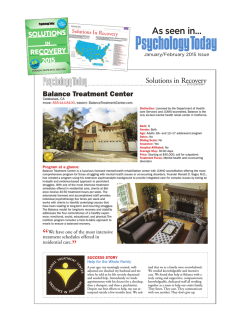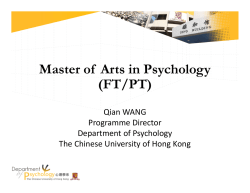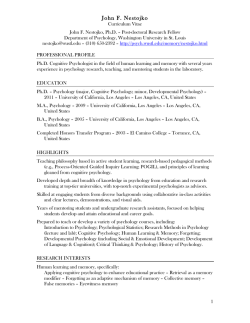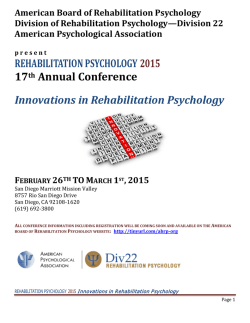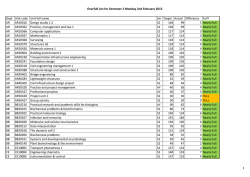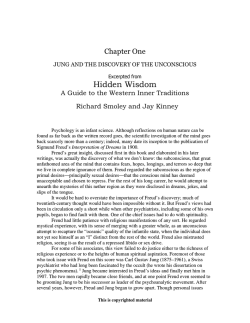
Does our unconscious rule?
ARTICLE difficult to describe, we are better off basing our decisions on our gut (i.e. intuition) (Dijksterhuis et al., 2006). The general claim is that we can ‘over think’ our choices and that this leads to poor decisions, judgements and inferences. This point also extends to highly skilled motor behaviour, such as expert tennis players or golfers that choke as a result of Magda Osman refocuses our view on the evidence deliberately analysing internal processes rather than just letting their intuitive mind do the work (Bell & Hardy, 2009). Who is ‘in control’? How do we here are many Big Ideas that place This is an example in which thinking a a heavy emphasis on shifting the achieve more ‘agency’? Is any lot is less effective than not thinking at ‘freedom to choose’ that we have responsibility of control away from all, and where feeling something right is illusory? Such debates run the conscious individual to our a better indicator of what to do than throughout bestsellers, including unconscious selves. These include: knowing why it might be right. the Nobel Prize-winning work of I Thinking hard is bad; Thinking We do indeed have a very Daniel Kahneman. This popular intuitively is good. sophisticated unconscious mechanism view – that much of what we do I Unconscious thinking is bad; that is able to abstract and integrate is shaped by unconscious thinking Thinking consciously is better. across lots of information that is difficult that we can’t access or reliably I Our brains are controlling us; We to evaluate consciously. So, if we sat down control – has impacted on many don’t have conscious control of and tried to calculate the pros and cons psychologists across different ourselves. deliberately and then try to pick the best domains. option, we These Big Ideas have filtered The aim of this article is to would be worse challenge this view, and to propose into the public domain through off than if we “What exactly is instinctive an unpopular alternative: We are popular science books, such as left it to our decision making? … There predominately conscious of, or can Risk (Gardner, 2008), Who’s in unconscious is no good definition” recover conscious access to, the Charge (Gazzaniga, 2011), Blink thought. intentions behind our actions. (Gladwell, 2007), The Self Dijksterhuis and Illusion (Hood (2012), Thinking, his colleagues (2006) Fast and Slow (Kahneman, 2011), The showed that as you ramp up the amount Decisive Moment (Lehrer, 2009) and of information you need to take into Nudge (Thaler & Sunstein, 2008). Along account to make your decisions, you’re with the fact that at least two of the ideas better off not thinking hard, because the Where do people most readily accept are in contradiction, the other problem is more complex the material the harder it is control and responsibility over their that the big ideas are often supported by on your memory and attention processes. choices? the same cited evidence from a few key The advantage of an unconscious system Do criticisms around evidence for the psychological studies. This issue will be is that it doesn’t require much memory or unconscious have implications for the main focus of my critical discussion. attention, which makes it hyper-efficient. government interventions such as This also means that it can process a lot ‘nudging’? of information quickly and accurately. So Thinking hard is bad; Thinking we have evidence for what seems like two Can our biases be brought under intuitively is good different minds, one fast, one slow. One control? There are many areas of psychology – requires a lot from attention and memory including judgement and decision processes and the other doesn’t making, and reasoning – that have shown (Kahneman, 2011). Osman, M. (2014). Future-minded: The that when it comes to complex decisions The problem is that Dijksterhuis et psychology of agency and control. that require us to pay attention to a lot of al.’s (2006) evidence which has been cited Basingstoke: Palgrave-Macmillan. information, or pay attention to particular in support of the first Big Idea is not types of information that might be terribly reliable. For a start there are many Does our unconscious rule? references resources questions T 114 Acker, F. (2008). New findings on unconscious versus conscious thought in decision making: Additional empirical data and metaanalysis. Judgment and Decision Making, 3, 292–303. Aczel, B., Lukacs, B., Komlos, J. & Aitken, M. (2011). Unconscious intuition or conscious analysis? Critical questions for the deliberation-without-attention paradigm. Judgment and Decision Making, 6, 351–358. Baumeister, R., Masicampo, E. & Vohs, K. (2011). Do conscious thoughts cause behaviour? Annual Review of Psychology, 62, 331–361. Bell, J.J. & Hardy, J. (2009). Effects of attentional focus on golf performance. Journal of Applied Sport Psychology, 21, 163–177. Calvillo, P., & Penaloza, A. (2009). Are complex decisions better left to the unconscious? Further failed replications of the deliberationwithout-attention effect, Judgment and Decision Making, 4, 509–517. Coffman, D.D. (1990). Effects of mental practice, physical practice, and knowledge of results on piano performance. Journal of Research in Music Education, 38(3), 187–196. Dijksterhuis, A., Bos, M.W., Nordgren, L.F. & van Baaren, R.B. (2006). On making the right choice: The deliberation-without attention effect. Science, 311, 1005–1007. Driskell, J.E., Copper, C. & Moran, A. (1994). Does mental practice enhance performance? Journal of Applied Psychology, 79, 481–491. Gardner, D. (2009). Risk: The science and politics of fear. London: Random House. vol 28 no 2 february 2015 unconscious thought failures to replicate the ‘deliberationinstinctive but disastrous decisions that Far from relying on so-called unconscious without-attention’ effect of Dijksterhuis et claim lives (Johnson, 2003). So thinking processes, to date, the most reliable al. (2006) (for example Aczel et al., 2011; instinctively is not to be relied on. evidence shows that in order to make Acker, 2008; Calvillo & Penaloza, 2009; In addition, the far less sensational better decisions in complex situations we Gonzalez-Vallejo et al., 2008; Mamede et and more intuitive claim that has been should commit conscious thought to the al., 2010; Newell et al., 2009; Payne et al., gaining steady support in psychology issue at hand. 2008; Rey et al., 2008; Thorstein & since the 1960s is that the more mental Conscious thought 1, Unconscious Withrow, 2009; Waroquier et al., 2009, practice people commit to complex tasks, thought 0? 2010) Moreover, at best, the failed the more they improve their performance replications show that there is no (Richardson, 1967). The findings show Unconscious thinking is bad; advantage for unconscious thinking that mental practice (rehearsing plans of Thinking consciously is better (assuming that this was what was tested) actions: Hegarty, 2004) and mental When it comes to decision making, there over consciously made decisions. Thus, simulation (preparing through imagining are three types of evidence that tantalise the message from an overwhelming various alternatives, the consequences of psychologists, neuroscientists and number of attempts to others into treating the unconscious replicate evidential as the dominant system, which all support for Big Idea 1 leads us in the wrong direction. The is that when it comes to first is that very speedy decisions big decisions, or for any often lead to error. Decision-making decisions at all for that researchers sometimes call these types matter, conscious thought of decisions automatic or fares much better. unconscious, but unfortunately Of course, many precision is lacking in defining will say that even if the exactly what is automatic or experimental lab work is unconscious (Osman, 2013). The problematic there are second is that there are common many examples of speedy decisions made in error under decision making in the pressure (i.e. when time to respond is real world in which limited and attention is overloaded). instinct appears to be the The third is that the rationale behind guiding factor in expertise. speedy decisions is hard to articulate. This has been discussed at Essentially Big Idea 2 is founded on length by the journalist claims that we often make speedy Gladwell (2007), and the decisions based on a tiny fraction of psychologist Gary Klein relevant information at any one time, (see Kahneman & Klein, because we are time-limited, and 2009). But there are often this makes us choose options problems here too. What We don’t know the frequency with which apparently instinctive that are bad for us (i.e. unhealthy, subexactly is instinctive decisions are made by experts in high-stake situations that optimal, short-sighted, dangerous, decision making, and what lead to good outcomes risky). is it about the process that The main problem with Big Idea 2, is instinctive? There is no as with Big Idea 1, is that we don’t good definition. Beyond have evidence of the frequency with that problem, what we don’t know is different outcomes from actions and which bad decisions are made as the the frequency with which apparently decisions: Taylor et al., 1998) improves result of what might be deemed as instinctive (let’s say speedy) decisions physical activities (e.g. basketball, unconscious, and so the reasons for errors are made by experts (e.g. fire-fighters, football, gymnastics, tennis, weight in decision making from those made doctors, pilots, nuclear power plant lifting) and mental activities (e.g. speedily could be multifaceted, and not operators) in high-stake situations that performing surgical procedures, landing simply because they were the result of the lead to good outcomes. While they can planes, making clinical assessments) unconscious. Some speculate that there make good decisions quickly, seemingly (Baumeister et al., 2011; Coffman, 1990; are situational factors and psychological without thinking, they can also make Driskell et al., 1994; Sevdalis et al., 2013). Gazzaniga, M.S. (2011). Who's in charge?: Free will and the science of the brain. New York: Ecco. Gladwell, M. (2007). Blink: The power of thinking without thinking. New York: Back Bay Books. Gonzalez-Vallejo, C., Lassiter, G.D., Bellezza, F.S. & Lindberg, M.J. (2008). ‘Save angels perhaps’: A critical examination of unconscious thought theory and the deliberation- without-attention effect. Review of General Psychology, 12, 282–296. Hegarty, M. (2004). Mechanical reasoning by mental simulation. Trends in Cognitive Sciences, 8, 280–285. Hood, B. (2012). The self illusion: How the social brain creates identity. New York: Oxford University Press. Johnson, C. (2003). Failure in safetycritical systems: A handbook of accident and incident reporting. read discuss contribute at www.thepsychologist.org.uk Glasgow: University of Glasgow Press. Kahneman, D. (2011). Thinking, fast and slow. New York: Farrar, Straus and Giroux. Kahneman, D. & Klein, G. (2009). Conditions for intuitive expertise: A failure to disagree. American Psychologist, 64, 515–526. Lehrer, J. (2009). The decisive moment: How the brain makes up its mind. Edinburgh: Canongate Books. Libet, B. (1985). Unconscious cerebral initiative and the role of conscious will in voluntary action .Behavioural and Brain Sciences, 8, 529–566. Mamede, S., Schmidt, H., Rikers, R. et al. (2010). Conscious thought beats deliberation without attention in diagnostic decision-making: At least when you are an expert. Psychological Research, 74, 586–592. 115 unconscious thought factors that bring about error prone unconscious decision-making, which I will now consider. Situational factors Does familiarity breed contempt? Being very familiar with a situation means that we can identify critical details that can be used to evaluate a situation, and this can also remind us of past similar situations that we’ve been in before. As a result, if we can assess without much evaluation the details of a situation in order to base our decisions, then we don’t need to bother inspecting to any great degree the decisions, actions and plans we implement in that situation. Essentially, the errors in decision making often come when we overlook vital information, or we chose to focus on incorrect or irrelevant information, or we make many more assumptions about the situation than are warranted. So, yes, familiarity can breed contempt, at least in terms of the outcomes of speedy decisions. But, familiarity is the hallmark of learning, and there are many more good speedy decisions made as a result of being in a familiar situation. Given the variety of decision contexts we are in every day, and the many thousands of speedy decisions we make (Osman, 2014), along with the many underlying differences in the information processing systems that enable speedy decision making, we are simply not advanced enough in our research to say conclusively that just because the situation is familiar (or even unfamiliar) we can predict more bad speedy decision making. Psychological factors: Hot and cold thinking The link between speedy decisions and emotions has often been made. There is no clear evidence to suggest outright that basing decisions on emotional states is conclusively bad, or conclusively good, any more than saying making speedy decisions in general is good or bad. Again, there is no real agreement about Miller, J., Shepherdson, P. & Treyena, D. (2011). Effects of clock monitoring on electroencephalographic activity: Is unconscious movement initiation an artifact of the clock? Psychological Science, 22, 103–109. Newell, B.R., Wong, K.Y., Cheung, C.H.J. & Rakow, T. (2009). Think, blink or sleep on it? The impact of modes of thought on complex decision making. Quarterly Journal of Experimental 116 the key underlying basis for speedy decisions with little deliberation without emotional involvement (cold decisions) and with the involvement of emotional states (hot decisions). This is because there are different factors that prompt speedy decisions for some situations (deciding whether to splash out on a nice meal, or save the money for a rainy day), and different factors that invoke speedy decisions for other situations (e.g. talking to two friends and figuring out how to calm an argument that has just started between them). If we assume that An arbitrary choice? experience allows us to make quick decisions, which sometimes lead to error as and an oscilloscope timer was used that well as success, and that experience is converts electrical signals so that they can gained through training and deliberation, be displayed on a screen. The task for the then training ourselves via mental person was simple. All they had to do was simulation and mental practice can also watch a rotating spot on a clock, and lift help us overcome errors we face, just as their finger when they felt like it. In it can help us improve decision making addition, after the spot stopped at a (Osman, 2014). random point, they have to say where the Conscious thought 2, Unconscious spot was on the clock when they had the thought 0? intention to lift their finger. Libet showed that the ‘free’ conscious intention to lift Our brains are controlling us the finger occurs approximately 200 The work of Benjamin Libet (1985) has milliseconds before the actual act of had one of the most significant impacts moving the finger. But the killer point is on the debate on free will and control. that there is neural activity in the motor His work revealed that instead of our cortex 500 milliseconds before the actual intentions causing our actions, our nonact of moving the finger. That is, the conscious brain processes initiate the preparation for moving the finger in other actions before we even intended to act. regions of the brain occurs even earlier Put simply, or brains are making the than when we have the conscious choices for us, and only later do we experience that we intend to move our consciously catch up with what we did. finger. Through a series of elegant experiments, From this very simple demonstration Libet was able to show this. One of the Libet was able to argue that consciousness most famous involved EEG is a late process because it takes time to (electroencephalogram) electrodes generate the necessary neural activity to attached to people’s scalps. These enable it to occur, and so the brain measured neural activity in the cortex prepares for actions far earlier than our Psychology, 62, 707–732. Osman, M. (2013). A case study: Dualprocess theories of higher cognition – Commentary on Evans & Stanovich (2013). Perspectives on Psychological Science, 8, 248–252. Osman, M. (2014). Future-minded: The psychology of agency and control. London: Palgrave-Macmillan. Payne, J.W., Samper, A., Bettman, J.R. & Luce, M.F. (2008). Boundary conditions on unconscious thought in complex decision making. Psychological Science, 19, 1118–1123. Rey, A., Goldstein, R.M. & Perruchet, P. (2009). Does unconscious thought improve complex decision making? Psychological Research, 73, 372–379. Richardson, A. (1967). Mental practice: A review and discussion II. Research Quarterly, 38(2), 263–273. Sevdalis, N., Aidan Moran, B.A., Si, F.P. & Arora, S. (2013). Mental imagery and mental practice applications in surgery: State of the art and future directions. In S. Lacey & R. Lawson (Eds.) Multisensory imagery (pp.343–363). New York: Springer. Taylor, S.E., Pham, L.B., Rivkin, I.D. & Armor, D.A. (1998). Harnessing the imagination: Mental simulation, selfregulation, and coping. American Psychologist. 53, 429–439. vol 28 no 2 february 2015 intentions and decisions to act. The only real use for consciousness is a veto: to prevent actions. So consciousness really is a ‘free won’t’ rather than free will. It is worth bearing in mind that there are some demonstrations that show that changing the format of the Libet’s experiment can reveal that the timings of intention and action actually correspond perfectly well (Miller et al., 2011). That is to say, our intentions are the factors that cause our actions. However, there is an even more profound problem with Libet’s set up, and that is that there is no actual incentive or motivation behind the ‘free’ action to move one’s finger. There are also no consequences for the action that is taken. It doesn’t affect anything, there is no intrinsic reward and there is no real reason for lifting one’s finger or not. So, the conditions of the experiment, and in turn the findings themselves, don’t have much of a bearing on almost all of the situations which we experience in the real world. Typically our actions: (a) do have consequences, (b) have rewards or punishments attached to them, and (c) are goal-directed. Arbitrary action is not really free will in what we would usually like it to mean, which is freedom to choose between options that matter to us. An arbitrary choice would be ‘Do I put a sock on my right foot first or my left foot?’. There is no attribution of responsibility and no consequences to my actions, other than one foot may be slightly colder than the other for a brief amount of time. Even if Libet type experiments might show that my motor cortex did indeed make the decision for such an arbitrary action (e.g. put the right sock on first), then so be it. At best, if the findings were actually sound, all they are suggesting is that for actions without consequence a random Thaler, R.H. & Sunstein, C.R. (2008). Nudge: Improving decisions about health, wealth, and happiness. New Haven, CT: Yale University Press. Thorsteinson, T. & Withrow, S. (2009). Does unconscious thought outperform conscious thought on complex decisions? A further examination. Judgment and Decision Making, 4, 235–247. Waroquier, L., Marchiori. D., Klein, O. & fluctuation of neural activities build up in such a way as to bring about one action over another, in the same way as flipping a coin. But if my motor cortex is going to decide 300 milliseconds, or even 10 seconds, before an action or decision that involves future consequences, such as which location to buy a house in or which school the kids go to, then I’m worried. For now, as has been argued by many notable neuroscientists, psychologists and philosophers, as remarkable as Libet’s finding is, it does not undermine our agency or our control. Conscious thought 3, Unconscious thought 0? View our complete archive and much more… Parting comment We may not want to hear this, because we are always looking for short cuts. But the message from a substantial body of research is that conscious processing has the primary role in supporting our decision making and the actions we plan on taking when we want to achieve a goal. The most effective way of making choices is to think through the consequences of our actions, and evaluate the information from the situation, as well as evaluating our own motivations. When it comes to controlling external situations as well as exerting self-control, we should accept the view that our conscious mind is at the forefront rather than in the background. When we accept this, we can have more control as a result. I leave you with a final thought: why would such an effortful system as our conscious mind still be around to enable us to make decisions and plan actions, if evolution didn’t select it in as an effective and necessary part of cognition? Magda Osman is Senior Lecturer in Psychology at Queen Mary University of London [email protected] Cleeremans, A. (2009). Methodological pitfalls of the unconscious thought paradigm. Judgment and Decision Making, 4, 601–610. Waroquier, L., Marchiori. D., Klein, O. & Cleeremans, A. (2010). Is it better to think unconsciously or to trust your first impression? A reassessment of unconscious thought theory. Social Psychological and Personality Science, 2, 111–118. read discuss contribute at www.thepsychologist.org.uk New website now live thepsychologist.bps.org.uk 117
© Copyright 2026
